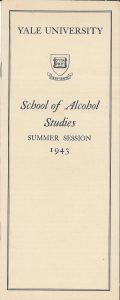 As announced last month, the Alcohol Studies Archives Exhibit was soft-launched and added to the RU Libraries Digital Exhibits page. The current, updated version features 51 pages with 403 images and 101 documents, with many links to related items in RUcore’s Alcohol Studies Collection.
As announced last month, the Alcohol Studies Archives Exhibit was soft-launched and added to the RU Libraries Digital Exhibits page. The current, updated version features 51 pages with 403 images and 101 documents, with many links to related items in RUcore’s Alcohol Studies Collection.
80 Years of Summer School of Alcohol Studies
Since 1943, the Summer School of Alcohol Studies (SSAS) has offered generations of addiction professionals, students, and advocates a unique, immersive educational experience. The digital exhibit “80 Years of the Summer School of Alcohol Studies” commemorates this remarkable legacy by showcasing material from the Rutgers Center of Alcohol Studies Archives. Through images, program brochures, lectures, schedules, and memorabilia, the exhibit captures the impact and spirit of an innovative program that helped shape alcohol education in the United States. From vintage photographs to decades-old lecture notes, the exhibit is more than a retrospective—it’s a celebration of the Summer School of Alcohol Studies, which transformed teaching about alcohol.
The first program in alcohol education
The exhibit opens with an overview of SSAS, the first program of its kind to offer a structured, interdisciplinary approach to education in alcohol studies. Drawing on materials from the Archives, the introductory section sets the stage with early flyers, press releases, and a rare group photo from the first Summer School in 1943, from a time when the very idea of scientific alcohol education was revolutionary.
SSAS began at Yale University as part of the pioneering Yale Center of Alcohol Studies. Archival items document its early years, including course schedules, lecture notes, and black-and-white photos of classes in session or as a group. One standout item is the Abridged Lectures of the First (1943) Summer Course on Alcohol Studies at Yale University, outlining the first formal curriculum in alcohol studies—a glimpse at how a movement began.
Faculty and Program
The list of lecturers who taught at SSAS reads like a Who’s Who of alcohol research and treatment from E. M. Jellinek to Raymond McCarthy to Gail Milgram. Drawing on rosters, photos, and conference proceedings, the exhibit profiles some of the most influential voices in the field from alcohol research, education, publishing, sociology, religion, public health, law enforcement, social work, and medicine. The variety underscores the interdisciplinary focus of SSAS from the beginning.

A tradition at SSAS, one of the many group photos from the exhibit features students and instructors. The professionally taken, large-scale photographs (ranging from 20 by 9 to 16 by 8 inches) became collector’s items and adorned the walls of the participants’ offices.
A section highlights lecture outlines, syllabi, and course descriptions from multiple eras. Whether it’s a 1950s seminar on addiction theory or a 1990s workshop on prevention strategies, the materials reveal how the curriculum adapted to reflect the changing understanding of alcohol use and treatment.

Cultural Life and Community
What made the Summer School unforgettable for so many was the experience itself—learning together, living in dorms, and connecting with individuals of same interests across professional lines. SSAS wasn’t all lectures and textbooks—social life played a big part in the Summer School experience.
The exhibit presents the life of students and alumni during the Summer School with group photos, content from the Alumni News, and memorabilia like T-shirts with SSAS logos, showing the school’s evolving program over the decades. The SSAS Alumni News page introduces an incredibly rich, historical resource, reminding us that SSAS was as much about connection and community as it was about education.
Program Legacy
When the Center of Alcohol Studies relocated to Rutgers in 1962, SSAS came with it. The exhibit follows the transition with photographs of the new CAS building, original correspondence about the move, and the first Rutgers-era program guides. These materials show how the Summer School flourished in its new home, gaining national visibility and a growing, diverse student body.
The exhibit reflects on SSAS’s impact, both in the field and at Rutgers. Documents from alumni illustrate how the program shaped careers and informed practice in addition to the School’s influence on alcohol education, national alcohol policy, and research. With its emphasis on evidence-based education and interdisciplinary dialogue, SSAS left a lasting legacy still felt today.